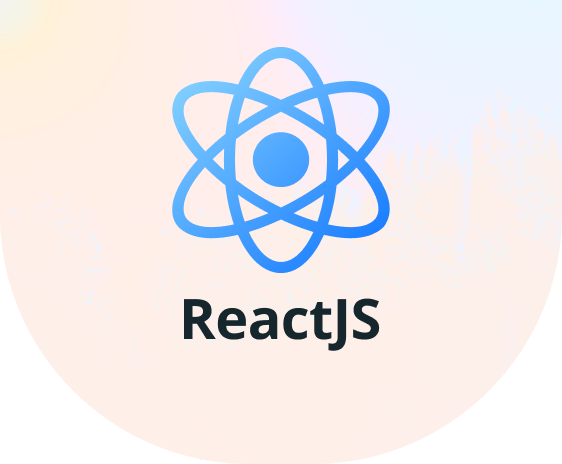


Are you looking for high-performance and engaging web solutions? Then connect with the ReactJS development company today to build cutting-edge, component-based apps customized to your business goals. Our ReactJS developers have hands-on experience in building interactive user interfaces, robust front-end architectures, and seamless single-page apps. If you are planning to kick-start with an MVP, enterprise-level dashboards, or a full-fledged web app, our software developers will help you with fast processing, swift user experiences, and maintainable code.
Empower your business with new revenue generation opportunities from our innovative ReactJS development services. Each service is crafted to provide your business with powerful, stable, adaptable, digitally advanced, and scalable business-driven applications. Utilize our array of development services to get truly progressive web and native mobile applications that are aligned with desired business requirements. Our expertise in bespoke software development projects, including the flexibility to integrate React with existing systems, ensures customizable engagement models for software development, whether it’s hiring specialists or outsourcing the entire project.
With our React development services, you can create custom ReactJS apps that meet industry standards and give you a competitive edge. As the top ReactJS development company, SPEC INDIA's committed ReactJS team of developers specializes in creating high-performing, cross-platform mobile apps for the iOS and Android platforms. They can customize the app to meet your specific needs and give your company the chance to boost revenue generation. Use specialized plugins and extensions created from our ReactJS resources to enhance your unique web or mobile application and satisfy your development requirements.

Web apps built with ReactJS are high-quality, high-performing, secure, and SEO-friendly. This is only possible with a dedicated ReactJS developer team offering top-notch ReactJS development services. Give your users the finest user experience with dynamic, interactive, and intuitive websites developed by our experienced ReactJS developers, who are keen to offer top-of-the-line development solutions. To ensure exceptional web application development, our web developers can also conduct ReactJS code audits.
Migrating an app from existing technology to ReactJS, especially when upgrading an existing web app for improved performance and user experience, is a big decision. However, our ReactJS developers can simplify it for you with expertise and years of experience. You can get rid of challenges and issues with seamless migration of apps to ReactJS, which offers user-oriented UI, responsiveness, enhanced security, and more. We will assist your business through the migration process to ensure hassle-free and roadblock-free migration.

Engaging apps are proven ways to enhance customer outreach, and we are the best ReactJS development company that offers PWA-ready attractive, powerful, and responsive front ends. React developers at SPEC INDIA would leverage one-way data binding, lightweight DOM, and more such features of ReactJS for ReactJS front-end development. We have a reputation for delivering projects perfectly aligned with clients’ project requirements along with implementing the latest UI/UX trends.
Interactive user interfaces for web applications are both interactive and highly engaging. It can draw users in and turn prospects into loyal customers. Our ReactJS developer will use ReactJS's most recent features to create visually appealing online applications. It is responsive, scalable, and high performing, which satisfies contemporary standards. As a result, business revenue increases as a result of these applications. Your users will be drawn in and have a memorable experience thanks to creative features in the enticing and simple layout.

You can gain access to the large pool of highly skilled React developers. With the expertise and skills of our dedicated team, you can handle complex projects, build custom web applications, and enhance user experience and conversion rates. Our ReactJS development team is trained and experienced in ensuring seamless project success, integrating seamlessly into existing teams through staff augmentation. We offer flexible engagement models for hiring. At SPEC INDIA, you can scale your development team to meet the ever-evolving business requirements.
React empowers developers with agility and cross-platform mobile app development with native look and feel. We offer end-to-end mobile app development services to businesses to launch powerful, scalable, and high-performing mobile apps for both iOS and Android platforms. Our expert React developers blend modern UI/UX design with efficient development practices to deliver seamless, responsive, and feature-rich mobile experiences.
Our specialty at SPEC INDIA is creating ReactJS plugins that are lightweight, reusable, and performance-optimized to meet specific requirements of your apps. Our skilled React developers create plugins that easily fit into your current React architecture, whether you need a custom user interface element, third-party API integration, sophisticated form control, or interactive data visualization.

We help clients maintaining their application’s performance by performing rigorous testing and fixing bugs. Our software testing services includes performance, functional, UI, integration, and end-to-end testing. Our QA engineers and React developers work hand-in-hand to build a reliable test architecture using modern tools like Jest, React Testing Library, Cypress, Enzyme, and more.
Keep your ReactJS applications performing at peak with our dedicated support and maintenance services. At SPEC INDIA, we go beyond just building applications — we ensure they stay secure, up-to-date, and optimized long after launch. Our team of experienced ReactJS developers provides continuous monitoring, performance tuning, version upgrades, bug fixes, and proactive issue resolution to guarantee seamless user experiences and business continuity.

Let’s fix performance issues or outdated frontend or build a new digital product together. We will help you with faster development, user-satisfying interfaces, and scalable ReactJS apps. Our React development team has a proven track record of making complex requirements seamless and building apps at a lightning-fast pace.
ReactJS is a powerful open-source front-end JavaScript library that offers development companies excellent features to develop exclusive interfaces and experiences for high-performance solutions. Its scalability, adaptability, and flexibility help developers streamline the process of front-end development to offer reliable Reactjs development services. As a leading ReactJS development company, we specialize in building custom web applications from scratch, designing intuitive user interfaces, and developing scalable and efficient React components to meet the diverse needs of our clients. Our software development company has the expertise to deliver results that exceed expectations, handling any React project, from simple to complex.
Developers, when developing with ReactJS, can have peace of mind not updating unnecessary objects in DOM while updating web apps, as this front-end library features virtual DOM. Apart from boasting speed and performance, it achieves no memory wastage, as all the changes are rendered in the virtual DOM, which changes only the updated components in the DOM.
Simply put, JSX is JavaScript + XML. This combination of HTML and JavaScript makes coding easy for developers when creating apps. Allowing the HTML-like text to coexist with JavaScript to react code, this extension allows the developer to describe the look of a mobile or web app UI.
Bestow your app with speed, flexibility, and modularity with ReactJS, leveraging its unidirectional data flow/one-way data binding. The restricted data flow from top to bottom/parent component to child component offers the developers better control over the app. ReactJS achieves it with a React JS app architecture component called Flux.
Developers can leverage the multi-component application with ReactJS owing to its component-based architecture. ReactJS consists of reusable components that build blocks of the app’s user interface with unique logic, controls, and design to define the app’s visuals and interactions, breaking complex apps into simple blocks.
React JS is known for developing engaging, interactive, and dynamic UIs for both web and mobile devices. It simplified the entire process for developers by creating a view system for each app in each state. Owing to its declarative approach, ReactJS updates the correct components for corresponding data changes, making it time-effective for developers.
When developing cross-compatible mobile apps or full-fledged UI apps, developers can leverage React’s support for server-side rendering, React Native, Redux, and Flux. Developers can now create aesthetically pleasing UI by owning these React extensions covering the entire app.
Cut down on the cumbersome task of finding the resource yourself. We have skilled and experienced ReactJS developers who are ready to extend your team. Our developers are proficient with extensive ReactJS development experience to build feature-rich front-end and web app solutions.
Hire Dedicated Reactjs Developers

Redux enhances React applications by centralizing state management, making it easier to handle complex data flows. It enables predictable state updates, improving maintainability and debugging. Developers can efficiently manage shared data across components without prop drilling. Redux is ideal for large-scale applications with intricate UI logic. It ensures consistency and control over app behavior.

React is perfect for building dynamic and responsive SPAs that load content without refreshing the page. It delivers a smooth user experience by updating the view in real-time. These applications are fast, lightweight, and reduce server load. SPAs built with React often result in better performance and user retention. They are suitable for dashboards, admin panels, and content-driven platforms.

React-based PWAs combine the best of web and mobile apps for a seamless, app-like experience. They support offline functionality, push notifications, and fast loading times. React's component-based structure makes PWA development scalable and efficient. PWAs are installable on devices, increasing engagement and accessibility. They are perfect for businesses aiming for cross-platform reach with minimal effort.
Explore Further
React enables the creation of highly interactive and real-time social apps, from messaging platforms to live feeds. Its virtual DOM ensures updates happen quickly and efficiently. Features like likes, comments, and notifications can be built with smooth UX. Integration with tools like Firebase or Socket.IO enhances real-time capabilities. These apps thrive on user engagement and dynamic content delivery.

React helps build high-performing, scalable eCommerce applications with intuitive user interfaces. It supports dynamic product listings, filters, cart management, and secure checkouts. With fast loading and modular design, it enhances the customer experience. Integration with backend APIs and payment gateways is seamless. React’s flexibility allows personalized shopping experiences and advanced features like AR or AI-driven recommendations.
Explore Further
React is ideal for developing custom web portals for employees, partners, or customers. It supports role-based access, data visualization, and personalized dashboards. Modular components allow for scalable architecture and efficient updates. Whether it's an HR portal, LMS, or client dashboard, React ensures performance and usability. These portals improve internal workflows and external communication for businesses.
Discover the diverse range of industries we proudly support with our innovative software solutions to companies of different business verticals. Our expertise spans multiple sectors, ensuring tailored services for every unique need.
The benefits of outsourcing ReactJS web application:
There is no exact answer to the question of accurately estimating software development costs for the React app. However, approximate React app development costs can be estimated based on factors like the app’s UI/UX design, category, complexity, scope and features, maintenance requirements, add-ons, distributions, and user authorization.
Apart from this, developer skills and experience, the agency’s location and the project deadline also play crucial roles in estimating the approximate cost of React app development.
SPEC INDIA ReactJS developers who abide by industry standards for ReactJS development. Our array of React development services includes post-development assistance to ensure the app’s smooth functioning.
ReactJS is a front-end library used for client-side programming. It helps in creating appealing user interfaces that hook up with clients. besides, it even creates seamless flow for your mobile or web app users so that they can easily navigate through the app.
SPEC INDIA offers the following hiring engagement options:
If you are planning to build a complex enterprise-grade app, be it a progressive web app or a dynamic single-page. On the other hand, if you are looking forward to developing an app with different packages and libraries, React JS is preferable to Angular. It is also a developer’s go-to choice for front-end UI that requires high user interaction.
SPEC House, Parth Complex, Near Swastik Cross Roads, Navarangpura, Ahmedabad 380009, INDIA.

This website uses cookies to ensure you get the best experience on our website. Read Spec India’s Privacy Policy